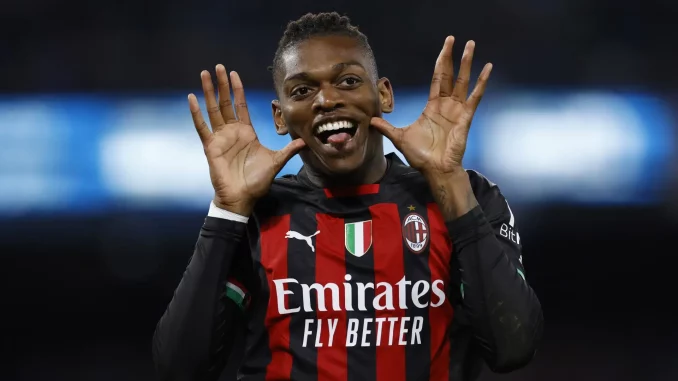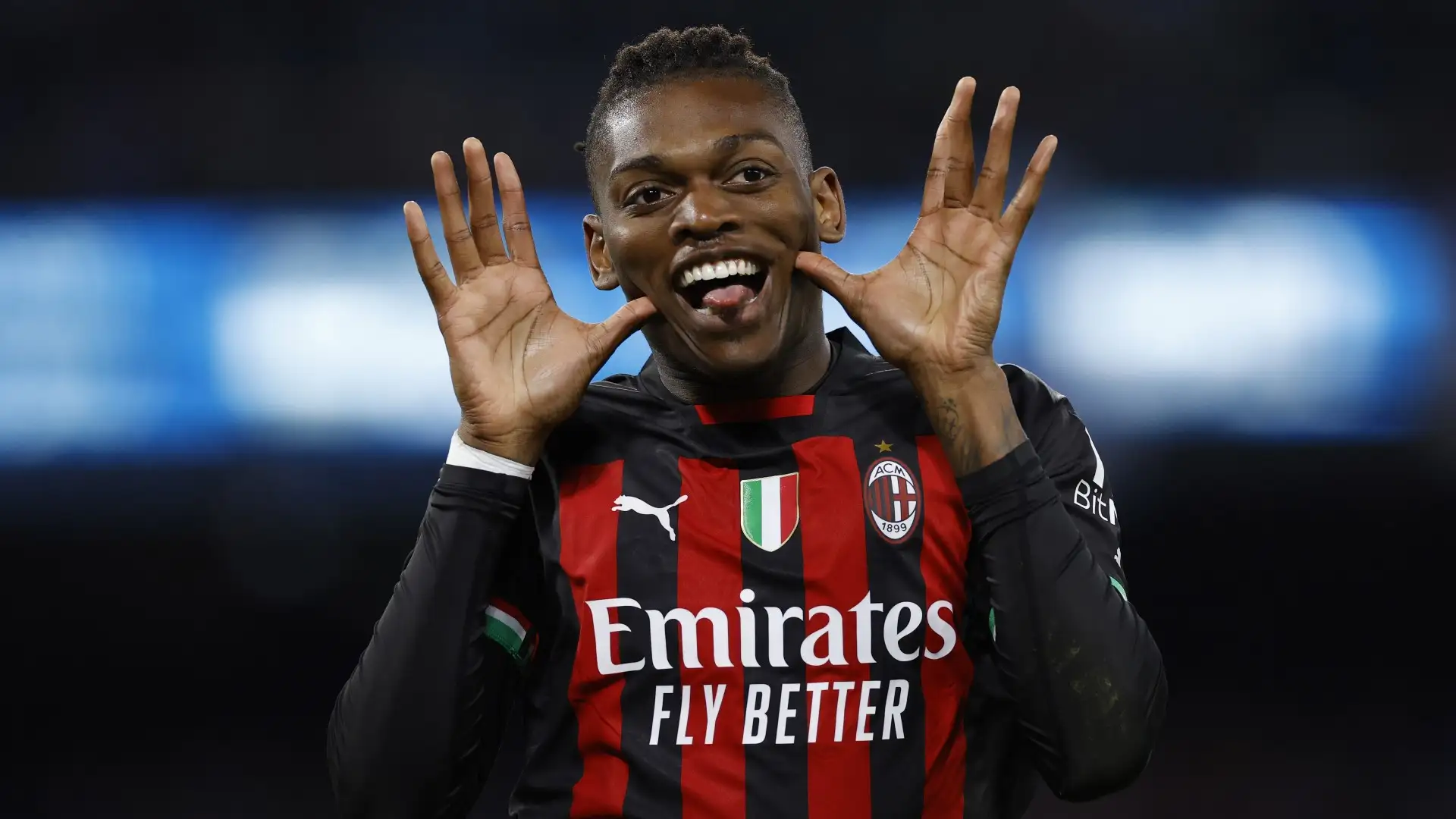

In a shocking turn of events during a routine training session, Portuguese coach Paulo Fonseca has found himself at the center of a media storm after reportedly slapping AC Milan star Rafael Leão. The incident, which took place in the midst of intense preparations for an upcoming Serie A match, has sparked widespread debate over the boundaries between tough love and misconduct in professional sports.
The 51-year-old Fonseca, known for his fiery passion on the sidelines and his no-nonsense approach to coaching, has a reputation for demanding the utmost discipline from his players. However, his recent outburst at Leão has raised questions about appropriate behavior in football, especially with regards to the relationship between managers and their players. Leão, 24, is one of the brightest young talents in European football, and the incident has left fans, pundits, and former players alike divided over what constitutes proper coaching and discipline in modern football.
The Incident: A Tense Training Session Escalates
According to several eyewitness accounts, the altercation occurred during a particularly intense training session earlier this week. Sources claim that Leão, known for his flair and individuality on the field, became frustrated with certain tactical drills laid out by Fonseca. Leão is said to have ignored several tactical instructions from the coaching staff, opting instead to take more creative liberties with his movements and plays.
While creativity is encouraged in football, especially for attacking players like Leão, the incident escalated when Fonseca, visibly frustrated by what he perceived as a lack of discipline, intervened. In a heated exchange, the coach reportedly slapped Leão across the face — a gesture that stunned those in attendance and caused immediate tension on the training pitch.
Several players reportedly rushed to separate the two men, and the atmosphere in the camp became notably tense following the incident. Although no further physical confrontations took place, the slap has since become the subject of intense scrutiny from both the media and the footballing community.
The Aftermath: Reactions and Apologies
Following the altercation, the club issued a brief statement confirming the incident but downplaying its significance. “There was a disagreement during training between Paulo Fonseca and Rafael Leão, but both parties have reconciled and are focused on the upcoming fixtures,” the statement read. “AC Milan remains committed to maintaining a professional and respectful environment for all players and staff.”
Leão, for his part, remained silent initially, but soon after, took to social media to address the incident. In a tweet posted later that day, Leão appeared to acknowledge the confrontation, writing, “We all have our moments of frustration, but we move forward with respect for each other. Let’s focus on what matters — the team.”
Fonseca, known for his emotional and fiery personality, also issued an apology in an exclusive interview with Italian sports outlet Gazzetta dello Sport. “I let my passion and my desire for discipline cloud my judgment,” Fonseca admitted. “What happened was inappropriate, and I apologize to Rafael. I expect more from myself as a coach, and I will work on how I communicate with my players in the future.”
Despite these apologies, the incident has continued to make waves, with many questioning the appropriateness of Fonseca’s behavior and whether such actions should be tolerated in modern professional sports.
A Divided Opinion: Discipline or Abuse?
The slap has sparked a fierce debate in the football community. On one side of the argument, some defend Fonseca, emphasizing the importance of maintaining discipline and a strong sense of hierarchy within a football team. Football is a high-pressure environment, and coaches often need to find ways to assert their authority and ensure players adhere to tactics and strategies. According to this line of thinking, Fonseca’s actions, while extreme, may have been born out of frustration with Leão’s apparent lack of focus during training.
Former footballer and pundit, Gianluca Vialli, weighed in on the situation, saying, “Sometimes, a coach has to get tough, especially with younger players. They are still learning the ropes, and discipline is crucial to their development. It’s unfortunate that it came to this, but we shouldn’t forget that players like Leão are still young. A firm hand might be necessary to keep them on track.”
Others, however, are quick to condemn Fonseca’s behavior as an overstep of boundaries and a display of physical aggression that has no place in professional football, or any sport for that matter. “There’s no room for physical violence in football, no matter the situation,” said sports psychologist Dr. Laura D’Angelo. “A slap, even if intended as a moment of discipline, crosses a line. Footballers are professionals, and while coaches are meant to be leaders, they also have a responsibility to lead with respect, patience, and understanding.”
The Complex Relationship Between Coaches and Players
The incident shines a light on the often complicated relationship between coaches and players in high-stakes sports like football. Coaches, especially those with a reputation for being tough or demanding, are often faced with the challenge of balancing authority with empathy. While the nature of football requires high levels of discipline and focus, modern coaching philosophies stress the importance of building strong, positive relationships with players, particularly the younger ones who are still developing both professionally and personally.
In recent years, many top managers, including Jurgen Klopp and Pep Guardiola, have emphasized the importance of building trust with players, fostering a sense of camaraderie, and avoiding methods that can undermine players’ confidence. This shift in coaching philosophy, which prioritizes mental well-being alongside physical fitness, has led some to argue that Fonseca’s actions were out of touch with contemporary coaching methods.
Leão, known for his skill, speed, and flair on the pitch, is widely regarded as one of the brightest young talents in world football. His ability to perform under pressure has earned him comparisons to some of the best forwards in Europe. However, his relationship with his coaches has at times been characterized by moments of friction, particularly when it comes to his tactical discipline. This incident, however, takes the tensions between player and manager to a new level and raises questions about whether such a confrontation will impact Leão’s future with the club.
What Happens Next for Leão and Fonseca?
Despite the controversy, both Fonseca and Leão are expected to move forward from the incident, at least publicly. For Leão, this episode could serve as a turning point in his relationship with his coach and his overall approach to discipline. The young forward’s talent is undeniable, but as he continues to mature as a player, he may need to demonstrate greater consistency in his commitment to the tactical demands of his coaches.
For Fonseca, the incident may serve as a lesson in how to manage high-strung moments with younger players. While his intentions may have been focused on improving Leão’s mentality, the method of delivery left much to be desired. The coming weeks will likely determine how this controversy impacts both the coach’s future at AC Milan and Leão’s relationship with the team.
As both men move forward, all eyes will remain on how they handle the fallout from this dramatic episode and whether the events of this week become a footnote in their careers or a defining moment of controversy.
Leave a Reply